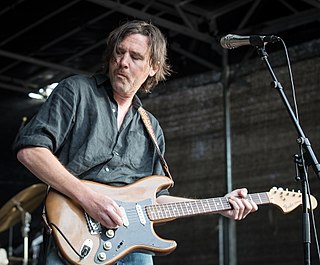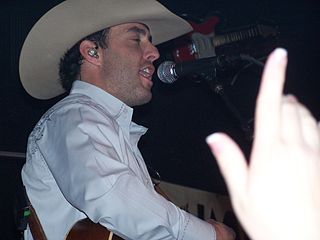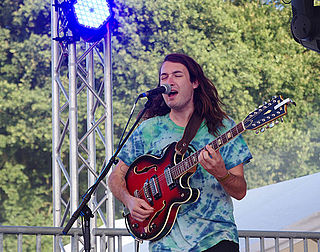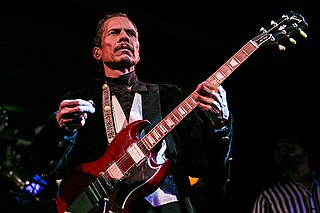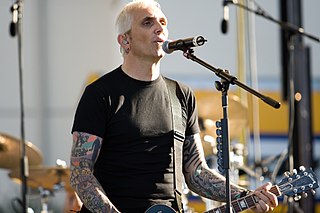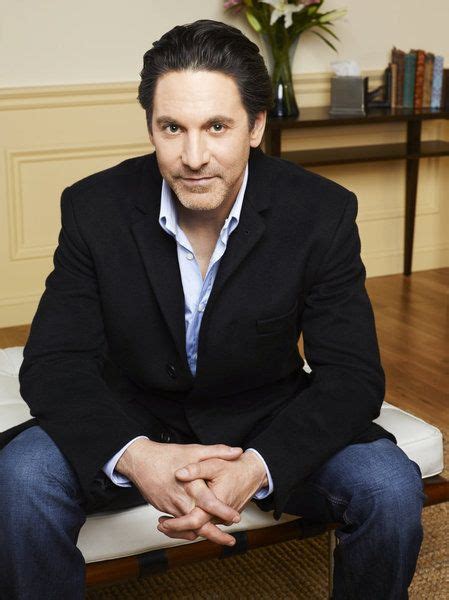A Quote by Nick Cave
My muse is my wife. It's not some vague thing that flutters around the astrosphere or wherever it is. Sometimes as a songwriter you need something to hang a song on, to give it some kind of presence and form. For me, Susie is that.
Related Quotes
I wouldn't want someone assuming that some negative song has some truth between me and my wife. There was a song that one of my buddies sent me, and it was an awesome song. It was about this woman who had fallen in love with a man that wasn't her husband, and I love everything about the song except for the fact that I personally cannot sing it. It would kill me if someone thought I was singing it about my wife.
I guess I don't really know any other way to do it, it just feels like the natural way to do things for me. Like - if I'm writing a song - it has to have some sort of value. Or it only has some kind of value to me, if it's something really personal. It has to mean something to me. I guess it is a little uncomfortable, or it's a little embarrassing sometimes, to know that stuff that honest is out there. But, when I hand off the thing, when it's totally done and mastered and sent, I kinda feel like it doesn't belong to me anymore.
[Calvin, who has the chicken pox, calls Susie on the telephone.] Susie: Hello? Calvin: Hi, Susie! It's me, Calvin! I was wondering if you'd like to come over and play. Susie: Why, sure! Boy, I don't think you've ever invited me to... Calvin's Mom: Calvin, what are you doing? Calvin: Nothing, Mom. Go away. Calvin's Mom: You're contagious! You can't have anyone over to play! Calvin: Shhhh! Shhhh! You'll spoil the whole thing! I was going to trick Susie into catching... HEY! OW! LET GO! Susie: [Hanging up the phone] Any chance of getting transferred, Dad?
I love it when people refer to me as a singer-songwriter. I get flutters in my stomach because they say, 'This is Grace VanderWaal, singer-songwriter,' not, 'This is Grace VanderWaal, winner of 'America's Got Talent.'' I'm so proud of that; it's such a big chapter of my life. But it's nice to kind of not be known as just that.
Frequently, I go straight into the studio and see what's around. I might hire a couple of instruments that I've never used - maybe a particular type of electronic organ or an echo unit. Then I just dabble with sounds until something starts to happen that suggests a texture. The texture suggests some kind of mood, and the mood suggests some kind of lyric. That's like working in reverse, often quite the other way around, from sound to song. Although often they stop before they get to the song stage.
So, in addition to being a full-time father of two and everything else in life, it isn't so much that I'm sitting around plotting an album. I just kinda follow my muse and wherever my interests lie, and at some point I decide, "Right. It's been a while, time to figure out how to get serious and make some music."
For my 21st birthday, I think my mother wanted to give me a watch, or something, you know, some kind of traditional thing. And I said, "Well, if you're going to buy me something, there's a Gibson Melody Maker guitar advertised in the paper for 60 dollars. Do you think I could have that?" And I think that she was very disappointed that at 21 I was still messing around with that sort of thing. She didn't understand what it was all about. But now she understands it, and likes it.
Sometimes I'll hear some music in my head or I'll go to the piano and mess around and come up with a tune, or be on the guitar and come up with some chords - or I'll come up with lines, or just some words, or just a sentence. It could be the title of a song. I do that all the time. I write titles of songs a lot. And sometimes I'll end up writing a song that I don't have a title for and I'll say, "Oh, this goes with that title".
An audience will let you know if a song communicates. If you see them kind of falling asleep during the song, or if they clap at the end of a song, then they're telling you something about the song. But you can have a good song that doesn't communicate. Perhaps that isn't a song that you can sing to people; perhaps that's a song that you sing to yourself. And some songs are maybe for a small audience, and some songs are for a wide audience. But the audience will let you know pretty quickly.
I think that when you do any kind of theatrical form, (you can't really do this in the theater) the task as an artist is to reach some form of catharsis yourself, and express something that allows an audience to have some form of catharsis. If there's no discovery in what you do, if there's no struggle in what you do to have that discovery, then, there's no meaning in what you do.

